- Home
- H. Beam Piper
Time and Time Again
Time and Time Again Read online
Produced by Greg Weeks, Mary Meehan and the OnlineDistributed Proofreading Team at https://www.pgdp.net
TIME AND TIME AGAIN
BY H. BEAM PIPER
Illustrated by Napoli
[Transcriber's note: This etext was produced from Astounding ScienceFiction April 1947. Extensive research did not uncover any evidence thatthe copyright on this publication was renewed.]
_To upset the stable, mighty stream of time would probably take an enormous concentration of energy. And it's not to be expected that a man would get a second chance at life. But an atomic might accomplish both--_
Blinded by the bomb-flash and numbed by the narcotic injection, he couldnot estimate the extent of his injuries, but he knew that he was dying.Around him, in the darkness, voices sounded as through a thick wall.
"They mighta left mosta these Joes where they was. Half of them won'teven last till the truck comes."
"No matter; so long as they're alive, they must be treated," anothervoice, crisp and cultivated, rebuked. "Better start taking names, whilewe're waiting."
"Yes, sir." Fingers fumbled at his identity badge. "Hartley, Allan;Captain, G5, Chem. Research AN/73/D. Serial, SO-23869403J."
"Allan Hartley!" The medic officer spoke in shocked surprise. "Why, he'sthe man who wrote 'Children of the Mist', 'Rose of Death', and'Conqueror's Road'!"
He tried to speak, and must have stirred; the corpsman's voicesharpened.
"Major, I think he's part conscious. Mebbe I better give him 'nothershot."
"Yes, yes; by all means, sergeant."
Something jabbed Allan Hartley in the back of the neck. Soft billows ofoblivion closed in upon him, and all that remained to him was a tinyspark of awareness, glowing alone and lost in a great darkness.
* * * * *
The Spark grew brighter. He was more than a something that merely knewthat it existed. He was a man, and he had a name, and a military rank,and memories. Memories of the searing blue-green flash, and of what hehad been doing outside the shelter the moment before, and memories ofthe month-long siege, and of the retreat from the north, and memories ofthe days before the War, back to the time when he had been little AllanHartley, a schoolboy, the son of a successful lawyer, in Williamsport,Pennsylvania.
His mother he could not remember; there was only a vague impression ofthe house full of people who had tried to comfort him for something hecould not understand. But he remembered the old German woman who hadkept house for his father, afterward, and he remembered his bedroom,with its chintz-covered chairs, and the warm-colored patch quilt on theold cherry bed, and the tan curtains at the windows, edged with duskyred, and the morning sun shining through them. He could almost see them,now.
He blinked. He _could_ see them!
* * * * *
For a long time, he lay staring at them unbelievingly, and then hedeliberately closed his eyes and counted ten seconds, and as he counted,terror gripped him. He was afraid to open them again, lest he findhimself blind, or gazing at the filth and wreckage of a blasted city,but when he reached ten, he forced himself to look, and gave a sigh ofrelief. The sunlit curtains and the sun-gilded mist outside were stillthere.
He reached out to check one sense against another, feeling the roughmonk's cloth and the edging of maroon silk thread. They were tangible aswell as visible. Then he saw that the back of his hand was unscarred.There should have been a scar, souvenir of a rough-and-tumble brawl ofhis cub reporter days. He examined both hands closely. An instant later,he had sat up in bed and thrown off the covers, partially removing hispajamas and inspecting as much of his body as was visible.
It was the smooth body of a little boy.
That was ridiculous. He was a man of forty-three; an army officer, achemist, once a best-selling novelist. He had been married, and divorcedten years ago. He looked again at his body. It was only twelve yearsold. Fourteen, at the very oldest. His eyes swept the room, wide withwonder. Every detail was familiar: the flower-splashed chair covers; thetable that served as desk and catch-all for his possessions; thedresser, with its mirror stuck full of pictures of aircraft. It was thebedroom of his childhood home. He swung his legs over the edge of thebed. They were six inches too short to reach the floor.
For an instant, the room spun dizzily; and he was in the grip of utterpanic, all confidence in the evidence of his senses lost. Was he insane?Or delirious? Or had the bomb really killed him; was this what death waslike? What was that thing, about "ye become as little children"? Hestarted to laugh, and his juvenile larynx made giggling sounds. Theyseemed funny, too, and aggravated his mirth. For a little while, he wason the edge of hysteria and then, when he managed to control hislaughter, he felt calmer. If he were dead, then he must be a discarnateentity, and would be able to penetrate matter. To his relief, he wasunable to push his hand through the bed. So he was alive; he was alsofully awake, and, he hoped, rational. He rose to his feet and prowledabout the room, taking stock of its contents.
There was no calendar in sight, and he could find no newspapers or datedperiodicals, but he knew that it was prior to July 18, 1946. On thatday, his fourteenth birthday, his father had given him a light .22rifle, and it had been hung on a pair of rustic forks on the wall. Itwas not there now, nor ever had been. On the table, he saw a boys' bookof military aircraft, with a clean, new dustjacket; the flyleaf wasinscribed: _To Allan Hartley, from his father, on his thirteenthbirthday, 7/18 '45._ Glancing out the window at the foliage on thetrees, he estimated the date at late July or early August, 1945; thatwould make him just thirteen.
His clothes were draped on a chair beside the bed. Stripping off hispajamas, he donned shorts, then sat down and picked up a pair oflemon-colored socks, which he regarded with disfavor. As he pulled oneon, a church bell began to clang. St. Boniface, up on the hill, ringingfor early Mass; so this was Sunday. He paused, the second sock in hishand.
There was no question that his present environment was actual. Yet, onthe other hand, he possessed a set of memories completely at variancewith it. Now, suppose, since his environment were not an illusion,everything else were? Suppose all these troublesome memories were nomore than a dream? Why, he was just little Allan Hartley, safe in hisroom on a Sunday morning, badly scared by a nightmare! Too much sciencefiction, Allan; too many comic books!
That was a wonderfully comforting thought, and he hugged it to himcontentedly. It lasted all the while he was buttoning up his shirt andpulling on his pants, but when he reached for his shoes, it evaporated.Ever since he had wakened, he realized, he had been occupied withthoughts utterly incomprehensible to any thirteen-year-old; eventhinking in words that would have been so much Sanscrit to himself atthirteen. He shook his head regretfully. The just-a-dream hypothesiswent by the deep six.
He picked up the second shoe and glared at it as though it wereresponsible for his predicament. He was going to have to be careful. Anunexpected display of adult characteristics might give rise to somequestions he would find hard to answer credibly. Fortunately, he was anonly child; there would be no brothers or sisters to trip him up. OldMrs. Stauber, the housekeeper, wouldn't be much of a problem; even inhis normal childhood, he had bulked like an intellectual giant incomparison to her. But his father--
Now, there the going would be tough. He knew that shrewd attorney'smind, whetted keen on a generation of lying and reluctant witnesses.Sooner or later, he would forget for an instant and betray himself. Thenhe smiled, remembering the books he had discovered, in his late 'teens,on his father's shelves and recalling the character of the openmindedagnostic lawyer. If he could only avoid the inevitable unmasking until
he had a plausible explanatory theory.
* * * * *
Blake Hartley was leaving the bathroom as Allan Hartley opened his doorand stepped into the hall. The lawyer was bare-armed and in slippers; atforty-eight, there was only a faint powdering of gray in his dark hair,and not a gray thread in his clipped mustache. The old Merry Widower,himself, Allan thought, grinning as he remembered the white-haired butstill vigorous man from whom he'd parted at the outbreak of the War.
"'Morning, Dad," he greeted.
"'Morning, son. You're up early. Going to Sunday school?"
Now there was the advantage of a father who'd cut his first intellectualtooth on Tom Paine and Bob Ingersoll; attendance at divine services wason a strictly voluntary basis.
"Why, I don't think so; I want to do some reading, this morning."
"That's always a good thing to do," Blake Hartley approved. "Afterbreakfast, suppose you take a walk down to the station and get me a_Times_." He dug in his trouser pocket and came out with a half dollar."Get anything you want for yourself, while you're at it."
Allan thanked his father and pocketed the coin.
"Mrs. Stauber'll still be at Mass," he suggested. "Say I get the papernow; breakfast won't be ready till she gets here."
"Good idea." Blake Hartley nodded, pleased. "You'll have three-quartersof an hour, at least."
* * * * *
So far, he congratulated himself, everything had gone smoothly.Finishing his toilet, he went downstairs and onto the street, turningleft at Brandon to Campbell, and left again in the direction of thestation. Before he reached the underpass, a dozen half-forgottenmemories had revived. Here was a house that would, in a few years, begutted by fire. Here were four dwellings standing where he had last seena five-story apartment building. A gasoline station and a weed-grown lotwould shortly be replaced by a supermarket. The environs of the stationitself were a complete puzzle to him, until he oriented himself.
He bought a New York _Times_, glancing first of all at the date line.Sunday, August 5, 1945; he'd estimated pretty closely. The battle ofOkinawa had been won. The Potsdam Conference had just ended. There werestill pictures of the B-25 crash against the Empire State Building, aweek ago Saturday. And Japan was still being pounded by bombs from theair and shells from off-shore naval guns. Why, tomorrow, Hiroshima wasdue for the Big Job! It amused him to reflect that he was probably theonly person in Williamsport who knew that.
On the way home, a boy, sitting on the top step of a front porch, hailedhim. Allan replied cordially, trying to remember who it was. Of course;Larry Morton! He and Allan had been buddies. They probably had beenswimming, or playing Commandos and Germans, the afternoon before. Larryhad gone to Cornell the same year that Allan had gone to Penn State;they had both graduated in 1954. Larry had gotten into some Governmentbureau, and then he had married a Pittsburgh girl, and had becometwelfth vice-president of her father's firm. He had been killed, in1968, in a plane crash.
"You gonna Sunday school?" Larry asked, mercifully unaware of the fateAllan foresaw for him.
"Why, no. I have some things I want to do at home." He'd have to watchhimself. Larry would spot a difference quicker than any adult. "Heckwith it," he added.
"Golly, I wisht I c'ld stay home from Sunday school whenever I wantedto," Larry envied. "How about us goin' swimmin', at the Canoe Club,'safter?"
Allan thought fast. "Gee, I wisht I c'ld," he replied, lowering hisgrammatical sights. "I gotta stay home, 'safter. We're expectin'comp'ny; coupla aunts of mine. Dad wants me to stay home when theycome."
That went over all right. Anybody knew that there was no rationalaccounting for the vagaries of the adult mind, and no appeal from adultdemands. The prospect of company at the Hartley home would keep Larryaway, that afternoon. He showed his disappointment.
"Aw, jeepers creepers!" he blasphemed euphemistically.
"Mebbe t'morrow," Allan said. "If I c'n make it. I gotta go, now; ain'thad breakfast yet." He scuffed his feet boyishly, exchanged so-longswith his friend, and continued homeward.
* * * * *
As he had hoped, the Sunday paper kept his father occupied at breakfast,to the exclusion of any dangerous table talk. Blake Hartley was stilldeep in the financial section when Allan left the table and went to thelibrary. There should be two books there to which he wanted badly torefer. For a while, he was afraid that his father had not acquired themprior to 1945, but he finally found them, and carried them onto thefront porch, along with a pencil and a ruled yellow scratch pad. In hisexperienced future--or his past-to-come--Allan Hartley had beenaccustomed to doing his thinking with a pencil. As reporter, as novelistplotting his work, as amateur chemist in his home laboratory, asscientific warfare research officer, his ideas had always been clarifiedby making notes. He pushed a chair to the table and built up the seatwith cushions, wondering how soon he would become used to theproportional disparity between himself and the furniture. As he openedthe books and took his pencil in his hand, there was one thing missing.If he could only smoke a pipe, now!
His father came out and stretched in a wicker chair with the _Times_book-review section. The morning hours passed. Allan Hartley leafedthrough one book and then the other. His pencil moved rapidly at times;at others, he doodled absently. There was no question, any more, in hismind, as to what or who he was. He was Allan Hartley, a man offorty-three, marooned in his own thirteen-year-old body, thirty yearsback in his own past. That was, of course, against all common sense, buthe was easily able to ignore that objection. It had been made before:against the astronomy of Copernicus, and the geography of Columbus, andthe biology of Darwin, and the industrial technology of Samuel Colt, andthe military doctrines of Charles de Gaulle. Today's common sense had ahabit of turning into tomorrow's utter nonsense. What he needed, rightnow, but bad, was a theory that would explain what had happened to him.
Understanding was beginning to dawn when Mrs. Stauber came out toannounce midday dinner.
"I hope you von't mind haffin' it so early," she apologized. "Meinsister, Jennie, offer in Nippenose, she iss sick; I vant to go see her,dis afternoon, yet. I'll be back in blenty time to get supper, Mr.Hartley."
"Hey, Dad!" Allan spoke up. "Why can't we get our own supper, and have apicnic, like? That'd be fun, and Mrs. Stauber could stay as long as shewanted to."
His father looked at him. Such consideration for others was a mostgratifying deviation from the juvenile norm; dawn of altruism, orsomething. He gave hearty assent:
"Why, of course, Mrs. Stauber. Allan and I can shift for ourselves, thisevening; can't we, Allan? You needn't come back till tomorrow morning."
"_Ach_, t'ank you! T'ank you so mooch, Mr. Hartley."
At dinner, Allan got out from under the burden of conversation byquestioning his father about the War and luring him into a lengthydissertation on the difficulties of the forthcoming invasion of Japan.In view of what he remembered of the next twenty-four hours, Allan wassecretly amused. His father was sure that the War would run on tomid-1946.
After dinner, they returned to the porch, Hartley _pere_ smoking a cigarand carrying out several law books. He only glanced at theseoccasionally; for the most part, he sat and blew smoke rings, andwatched them float away. Some thrice-guilty felon was about to betriumphantly acquitted by a weeping jury; Allan could recognize acourtroom masterpiece in the process of incubation.
* * * * *
It was several hours later that the crunch of feet on the walk causedfather and son to look up simultaneously. The approaching visitor was atall man in a rumpled black suit; he had knobby wrists and big, awkwardhands; black hair flecked with gray, and a harsh, bigoted face. Allanremembered him. Frank Gutchall. Lived on Campbell Street; a religiousfanatic, and some sort of lay preacher. Maybe he needed legal advice;Allan could vaguely remember some incident--
"Ah, good afternoon, Mr. Gutchall. Lovely day, isn't it?" Blake Hartl
eysaid.
Gutchall cleared his throat. "Mr. Hartley, I wonder if you could lend mea gun and some bullets," he began, embarrassedly. "My little dog's beenhurt, and it's suffering something terrible. I want a gun, to put thepoor thing out of its pain."
"Why, yes; of course. How would a 20-gauge shotgun do?" Blake Hartleyasked. "You wouldn't want anything heavy."
Gutchall fidgeted. "Why, er, I was hoping you'd let me have a littlegun." He held his hands about six inches apart. "A pistol, that I couldput in my pocket. It wouldn't look right, to carry a hunting gun on theLord's day; people wouldn't understand that it was for a work of mercy."
The lawyer nodded. In view of Gutchall's religious beliefs, theobjection made sense.
"Well, I have a Colt .38-special," he said, "but you know, I belong tothis Auxiliary Police outfit. If I were called out for duty, thisevening, I'd need it. How soon could you bring it back?"
Something clicked in Allan Hartley's mind. He remembered, now, what thatincident had been. He knew, too, what he had to do.
"Dad, aren't there some cartridges left for the Luger?" he asked.
Blake Hartley snapped his fingers. "By George, yes! I have a Germanautomatic I can let you have, but I wish you'd bring it back as soon aspossible. I'll get it for you."
Before he could rise, Allan was on his feet.
"Sit still, Dad; I'll get it. I know where the cartridges are." Withthat, he darted into

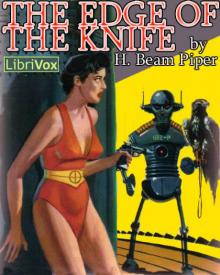 The Edge of the Knife
The Edge of the Knife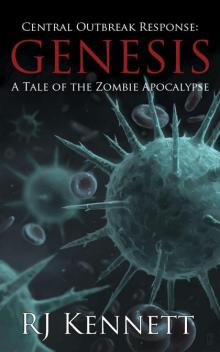 Genesis
Genesis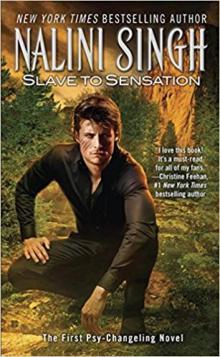 A Slave is a Slave
A Slave is a Slave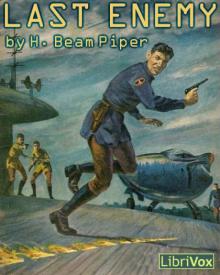 Last Enemy
Last Enemy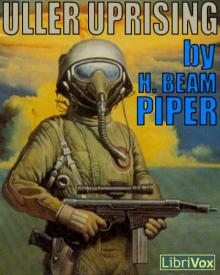 Uller Uprising
Uller Uprising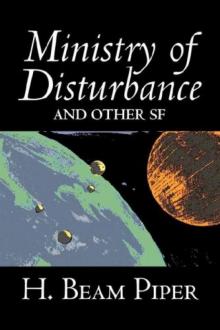 Ministry of Disturbance
Ministry of Disturbance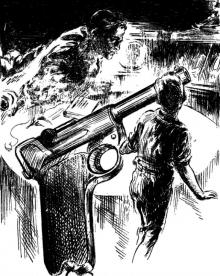 Time and Time Again
Time and Time Again The Mercenaries
The Mercenaries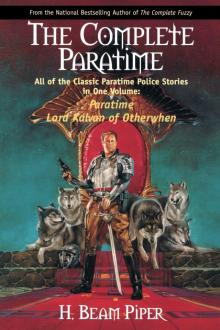 Police Operation
Police Operation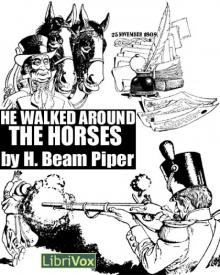 He Walked Around the Horses
He Walked Around the Horses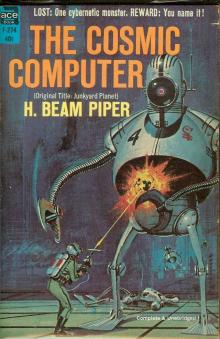 Time Crime
Time Crime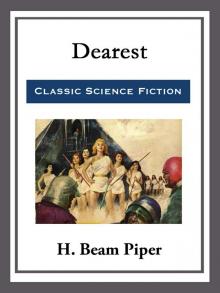 Dearest
Dearest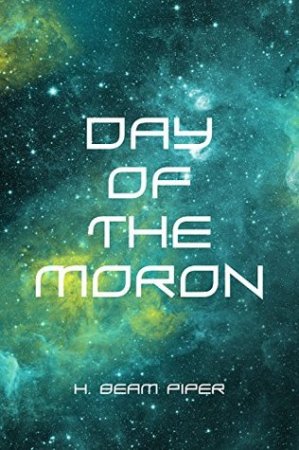 Day of the Moron
Day of the Moron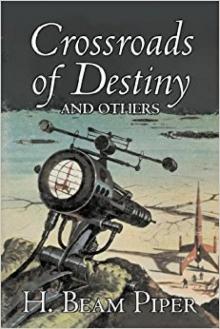 Crossroads of Destiny
Crossroads of Destiny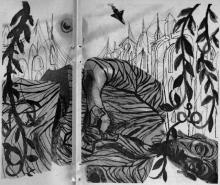 Graveyard of Dreams
Graveyard of Dreams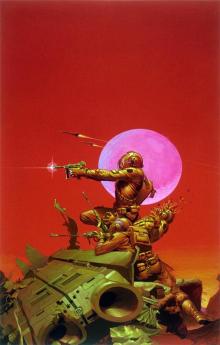 The Cosmic Computer
The Cosmic Computer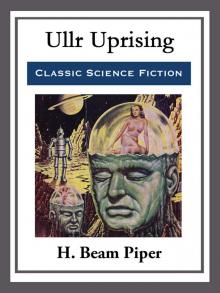 Ullr Uprising
Ullr Uprising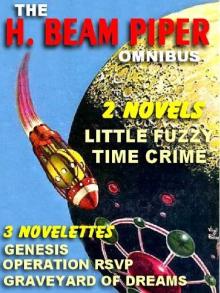 Operation R.S.V.P.
Operation R.S.V.P.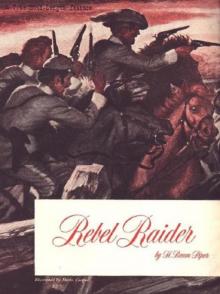 Rebel Raider
Rebel Raider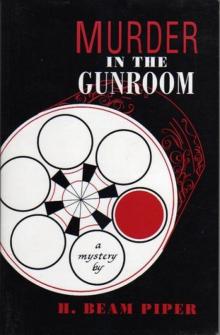 Murder in the Gunroom
Murder in the Gunroom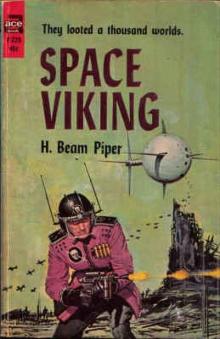 Space Viking
Space Viking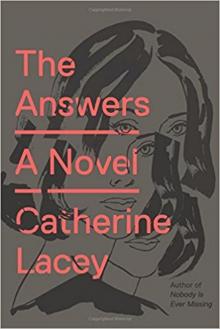 The Answer
The Answer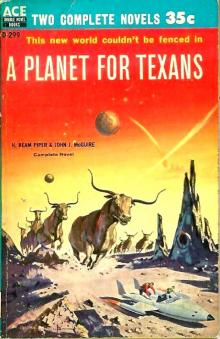 A Planet for Texans (aka Lone Star Planet)
A Planet for Texans (aka Lone Star Planet)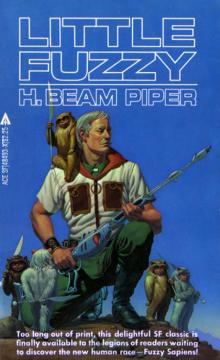 Little Fuzzy
Little Fuzzy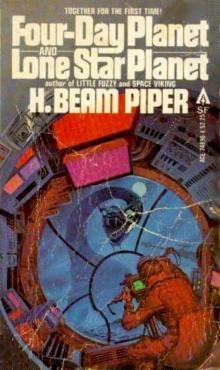 Four-Day Planet
Four-Day Planet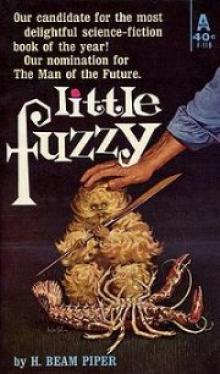 Little Fuzzy f-1
Little Fuzzy f-1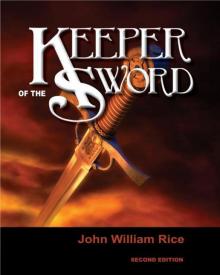 Keeper
Keeper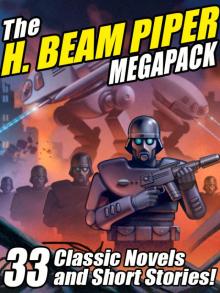 The H. Beam Piper Megapack
The H. Beam Piper Megapack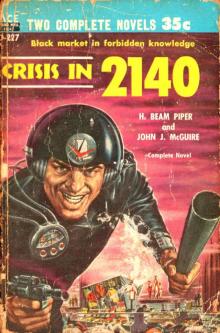 H. Beam Piper
H. Beam Piper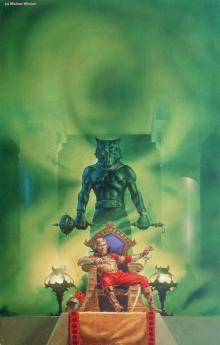 Lord Kalvan of Otherwhen
Lord Kalvan of Otherwhen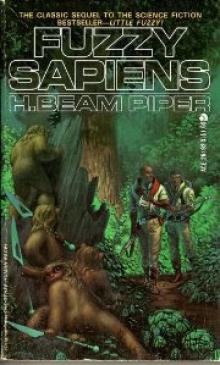 Fuzzy Sapiens f-2
Fuzzy Sapiens f-2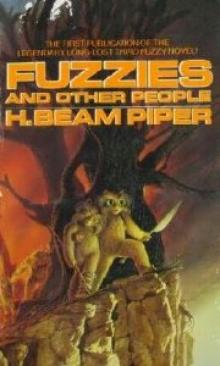 Fuzzies and Other People f-3
Fuzzies and Other People f-3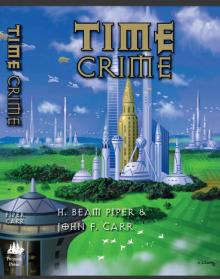 TIME PRIME
TIME PRIME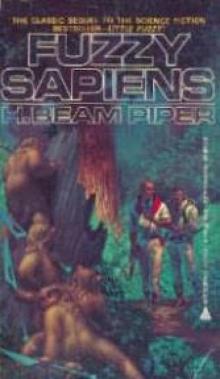 Fuzzy Sapiens
Fuzzy Sapiens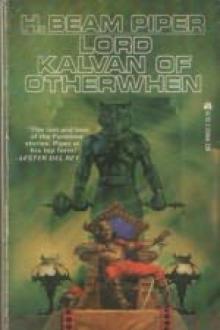 Lord Kalvan of Otherwhen k-1
Lord Kalvan of Otherwhen k-1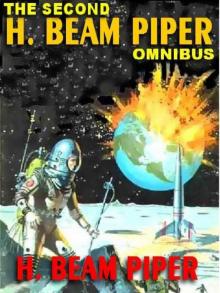 The Second H. Beam Piper Omnibus
The Second H. Beam Piper Omnibus